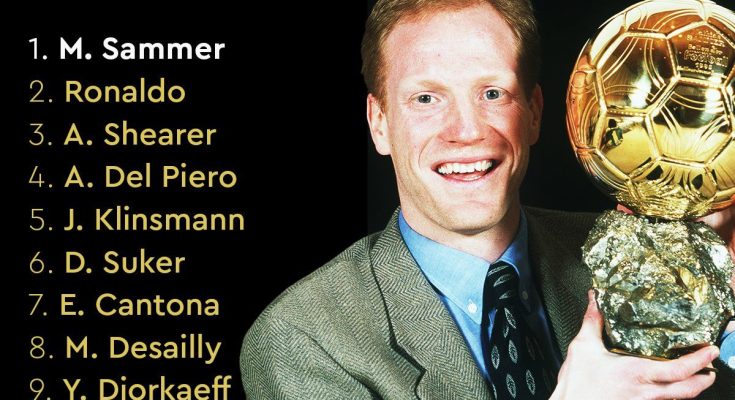Borussia Dortmund has always been a club steeped in history, passion, and unforgettable moments, but when it comes to individual global recognition, very few players have ever carried the black and yellow flag onto the world’s grandest stage. In fact, the only Borussia Dortmund player ever to lift the prestigious Ballon d’Or is Matthias Sammer. His victory remains not only a milestone for the club but also one of the most iconic achievements in German football during the 1990s. That single triumph, immortalized in football history, carries layers of nostalgia, prestige, and respect, making Sammer’s name eternally etched in gold among the legends of the sport. Looking back at the sheer list of players who have held the honor before and after him, it becomes clear just how monumental that feat was. Names such as Michel Platini, Marco van Basten, George Weah, Ronaldo, and Zinedine Zidane surround the Ballon d’Or legacy, making Sammer’s presence among them all the more special.
For Borussia Dortmund, Sammer’s victory was more than just an individual prize—it was validation of a philosophy, proof that hard work and collective belief could produce the finest player in the world. The Ballon d’Or is not just an award handed out lightly. It recognizes excellence, brilliance, consistency, and influence on the game at the highest level. For Sammer to win it while playing for Dortmund speaks volumes about his impact and the club’s rising status at the time. The mid-1990s were an era of growth for BVB, building toward becoming one of the most powerful teams in Europe. Sammer’s victory encapsulated that upward journey and put Dortmund’s name among Europe’s elite in ways that could not be ignored.
Sammer himself was not your typical winner of the Ballon d’Or. Traditionally, the award went to glamorous attackers, goal-scoring geniuses, or midfield magicians who wowed audiences with flair and elegance. Think of Johan Cruyff, Diego Maradona, or later, Cristiano Ronaldo and Lionel Messi. Sammer, on the other hand, was a sweeper—a defensive leader who marshaled his backline with discipline, aggression, and unmatched intelligence. His game was built on tactical awareness, impeccable timing, and leadership qualities that elevated those around him. He was the embodiment of balance: strong defensively, confident on the ball, and capable of driving his team forward from the back.
In 1996, the year of his Ballon d’Or triumph, Sammer was at his peak. Playing under Ottmar Hitzfeld for Borussia Dortmund, he was the beating heart of a side that combined tactical discipline with explosive attacking power. His performances for both club and country that year were nothing short of extraordinary. While his domestic success with Dortmund set the stage, it was his commanding display at Euro 1996 with Germany that sealed his status as the world’s best. He played a key role in leading Germany to the European Championship title, orchestrating the defense and providing moments of inspiration when it mattered most. It was a performance that resonated across the footballing world, one that highlighted his unique blend of steel and composure.
Dortmund fans look back on that era with immense pride. The mid-1990s were about more than just winning trophies; they were about establishing Dortmund as a genuine European heavyweight. With talents such as Andreas Möller, Karl-Heinz Riedle, and Stéphane Chapuisat, the team had attacking brilliance, but it was Sammer’s influence that provided the glue. His leadership turned good players into great ones, and his presence gave Dortmund the kind of stability that championship-winning sides always require. His Ballon d’Or victory was the crowning jewel on a period that saw Dortmund rise toward Bundesliga dominance and eventually European glory with their 1997 Champions League win.
What makes Sammer’s Ballon d’Or even more unique is the fact that it is so rare for defensive players to win the award. In the entire history of the prize, only a handful of defenders have ever been recognized. Fabio Cannavaro famously won it in 2006 after leading Italy to World Cup glory, and before him, names like Franz Beckenbauer were among the few defensive legends to achieve the honor. To be included in such company demonstrates the sheer magnitude of Sammer’s performances. In a football culture that often worships goals and assists, his ability to shine as a defender and still outshine attackers is a testament to his mastery of the game.
Looking at the list of Ballon d’Or winners across history provides a fascinating backdrop to Sammer’s triumph. Before him, stars like Marco van Basten, Lothar Matthäus, and Jean-Pierre Papin had been crowned. Shortly after, Ronaldo, Zinedine Zidane, and Rivaldo would add their names. Each of these figures brought with them moments of magic and unforgettable highlights. Sammer’s inclusion in that pantheon might seem unconventional to some, but it also reinforces the point that football is not just about glamour—it is about influence, resilience, and leadership.
For Dortmund fans today, the story of Sammer’s Ballon d’Or is more than just history; it is a reminder of what the club can achieve when all the pieces fall into place. Despite producing world-class talents like Robert Lewandowski, Marco Reus, and Erling Haaland in recent years, none have managed to replicate Sammer’s achievement while wearing the Dortmund jersey. Lewandowski came close, but by the time he reached his Ballon d’Or-level form, he was already shining for Bayern Munich. Haaland, too, has all the makings of a future winner, but his journey toward the top came after he left Dortmund for Manchester City. That makes Sammer’s triumph all the more sacred—it is not just a reflection of his brilliance but also a unique badge of honor that belongs solely to Borussia Dortmund.
It is also worth considering the impact his success had on German football as a whole. Coming in the aftermath of reunification, German football was in a period of transition. Sammer, himself an East German who had represented the GDR national team before unification, symbolized the blending of two footballing traditions. His leadership in the German team at Euro 1996 helped bring the country together in sporting terms, showing that the unified Germany could dominate just as strongly as West Germany had in the past. His Ballon d’Or victory thus carried a deeper meaning beyond the pitch—it was a symbol of national unity, strength, and pride at a crucial time in history.
Sammer’s later career as a coach, sporting director, and pundit has further cemented his legacy in German football. While injuries eventually cut his playing career short, his mind for the game remained as sharp as ever. He served as a coach for Dortmund, and later as sporting director for the German national team, playing a pivotal role in shaping the philosophy that ultimately led to Germany’s 2014 World Cup triumph. Even off the field, his influence is felt across generations, reinforcing the idea that his Ballon d’Or was not a fluke or a one-year wonder, but part of a much larger legacy.
When fans look back at that golden era, the names of his contemporaries—Möller, Riedle, Chapuisat, and Hitzfeld—shine brightly, but Sammer’s Ballon d’Or stands above them all as the ultimate symbol of recognition. It represents a moment when Dortmund was not just competing, but setting the standard in world football. It is a reminder that the club, despite competing with financial giants like Bayern Munich, Real Madrid, and AC Milan at the time, had the ability to produce the very best.
Today, in an era dominated by Lionel Messi and Cristiano Ronaldo for over a decade, the Ballon d’Or often feels like a prize reserved only for attackers who break scoring records. Sammer’s achievement feels almost impossible to replicate under modern conditions, where defenders and defensive midfielders rarely get the recognition they deserve. That makes his triumph all the more timeless—it belongs to a different era, one where leadership and tactical intelligence were celebrated just as much as goals and assists.
For Borussia Dortmund, it is a source of endless pride. Even as the club continues to nurture young talents and fight for titles, Sammer’s Ballon d’Or remains a beacon of inspiration. It tells every young player who steps onto the pitch at Signal Iduna Park that greatness is possible, that history can be made, and that Dortmund is not just a stepping-stone but a destination where legends can be forged. The sight of Sammer lifting that golden ball is still shared in highlight reels, fan pages, and conversations among supporters as a way of reminding everyone that Dortmund has already had a player considered the very best in the world.
As football continues to evolve and new generations of stars rise, one thing will remain unchanged: Matthias Sammer will forever be the one and only Borussia Dortmund player to have won the Ballon d’Or. That uniqueness makes the achievement even more beautiful. Just one man, one player, one defender, standing tall in black and yellow among the greatest names in football history. For Dortmund fans, that is not just a statistic, but a story of pride, identity, and inspiration. It is proof that even in a world dominated by giants, Dortmund has already written its golden chapter, and Matthias Sammer is the immortal name at its heart.



